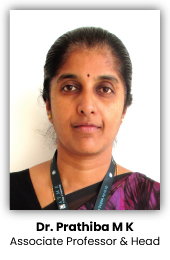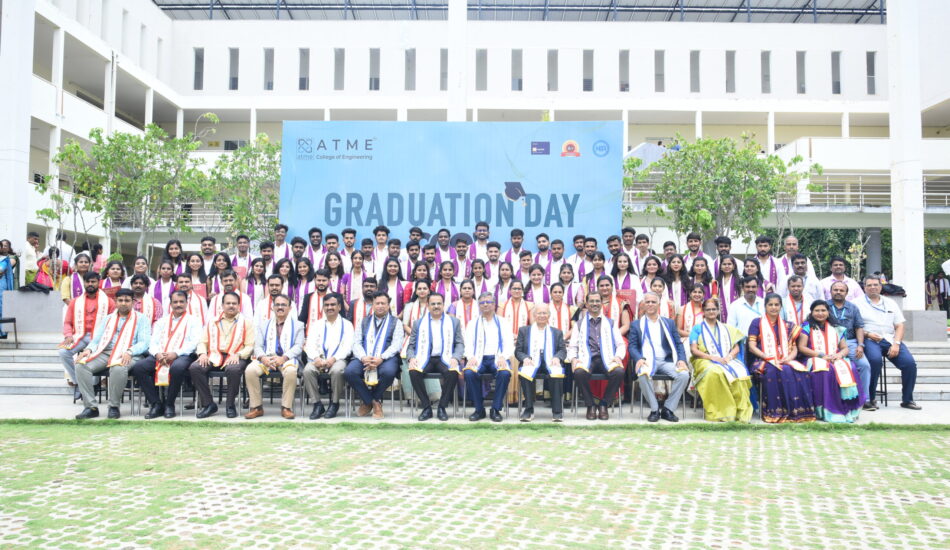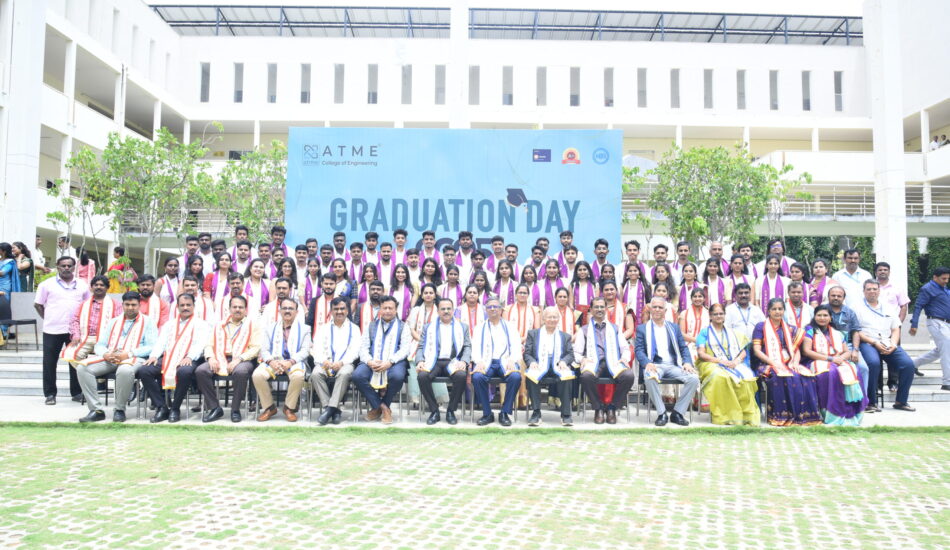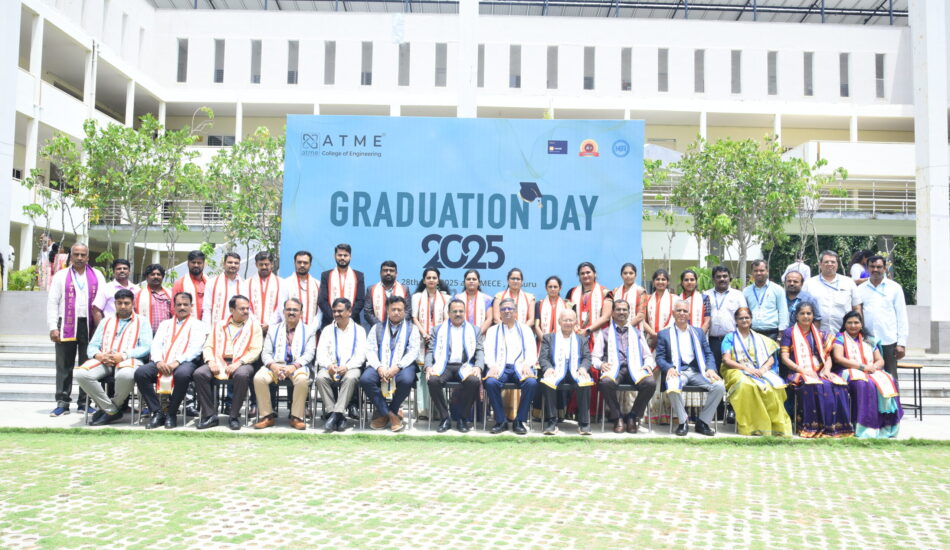NBA Accredited (1st July 2025 to 31st Dec 2028) - Department of Electronics & Communication Engineering
About the Department
The Department of Electronics and Communication Engineering at ATME College of Engineering, Mysuru, has been a hub of innovation and excellence since its inception in 2010, with intake enhanced to 120 students in 2012. Over the years, the department has continuously evolved, achieving significant milestones in academics, research, and innovation. Set up a dedicated Research Center in 2014 to promote research culture. Department achieved NBA Accreditation in 2019 and Re-accreditation in 2022, ensuring quality standards in engineering education. It has successfully executed funded projects including a 2.22 Crore DST Project, AICTE MODROB (₹10.7 Lakhs), and SERB-funded research projects. In 2025, the department proudly introduced B.E. Honors, reflecting its commitment to academic advancement. With a strong focus on research, innovation, and student development, the department nurtures students to become competent engineers, researchers, and entrepreneurs, contributing to society and industry with cutting-edge solutions.
HODs Message:

Electronics & Communication Department feels proud of the quality & need based instruction & Practical training imparted to its students to face the challenges of the fast changing corporate and technical world. Because of the dedicated faculty & excellent coaching in both theoretical and practical, students coming out from the portal of the ECE department are placed in top ranking companies in India & abroad, many students have gone for higher studies. In ECE department, students will study wide variety of Theoretical & Industry oriented subjects. The students will also implement their theoretical knowledge through mini & major projects which involve the innovative ideas & social relevance. It also provides a platform for the Research in the emerging areas through its research center & exhibit student co-curricular activities, paper presentation, innovative ideas, technical talents through IETE. ECE department is a right place to reach the goal and shape up the career.
– Dr. Prathiba M K
To develop highly skilled and globally competent professionals in the field of Electronics and Communication Engineering to meet industrial and social requirements with ethical responsibility.
- To provide State-of-art technical education in Electronics and Communication at undergraduate and post-graduate levels, to meet the needs of the profession and society and achieve excellence in teaching-learning and research.
- To develop talented and committed human resource, by providing an opportunity for innovation, creativity and entrepreneurial leadership with high standards of professional ethics, transparency and accountability.
- To function collaboratively with technical Institutes/Universities/Industries, offer opportunities for interaction among faculty-students and promote networking with alumni, industries and other stake-holders.
After successful completion of program:
- PEO1: To produce graduates to excel in the profession, higher education and pursue research exercises in Electronics and Communication Engineering.
- PEO2: To create technically able alumni with the capacity to examine, plan, to create and execute Electronics and Communication frameworks thereby involving in deep routed learning.
Engineering Graduates will be able to:
- PO1. Engineering knowledge: Apply the knowledge of mathematics, science, engineering fundamentals, and an engineering specialization to the solution of complex engineering problems.
- PO2. Problem analysis: Identify, formulate, review research literature, and analyze complex engineering problems reaching substantiated conclusions using first principles of mathematics, natural sciences, and engineering sciences.
- PO3. Design/development of solutions: Design solutions for complex engineering problems and design system components or processes that meet the specified needs with appropriate consideration for the public health and safety, and the cultural, societal, and environmental considerations.
- PO4. Conduct investigations of complex problems: Use research-based knowledge and research methods including design of experiments, analysis and interpretation of data, and synthesis of the information to provide valid conclusions.
- PO5. Modern tool usage: Create, select, and apply appropriate techniques, resources, and modern engineering and IT tools including prediction and modeling to complex engineering activities with an understanding of the limitations.
- PO6. The engineer and society: Apply reasoning informed by the contextual knowledge to assess societal, health, safety, legal and cultural issues and the consequent responsibilities relevant to the professional engineering practice.
- PO7. Environment and sustainability: Understand the impact of the professional engineering solutions in societal and environmental contexts, and demonstrate the knowledge of, and need for sustainable development.
- PO8. Ethics: Apply ethical principles and commit to professional ethics and responsibilities and norms of the engineering practice.
- PO9. Individual and team work: Function effectively as an individual, and as a member or leader in diverse teams, and in multidisciplinary settings.
- PO10. Communication: Communicate effectively on complex engineering activities with the engineering community and with society at large, such as, being able to comprehend and write effective reports and design documentation, make effective presentations, and give and receive clear instructions.
- PO11. Project management and finance: Demonstrate knowledge and understanding of the engineering and management principles and apply these to one’s own work, as a member and leader in a team, to manage projects and in multidisciplinary environments.
- PO12. Life-long learning: Recognize the need for, and have the preparation and ability to engage in independent and life-long learning in the broadest context of technological change.
At the end of graduation the student will be able:
PSO1: To have the capability to understand and adopt the technological advancements with the usage of modern tool to analyze and design embedded system or processes for variety of applications.
PSO2: To work effectively in a group as an independent visionary, team member and leader having the ability to understand the requirement and develop feasible solutions to emerge as potential core or electronic engineer
- To improve academic performance of students using innovative and creative methods of teaching.
- To conduct programs for students to acquire better skills.
- To encourage research activities.
- To strengthen the department infrastructure and human resources.
- To conduct workshops/conferences/seminars for knowledge sharing.
- To take up sponsored projects from private and government organizations.
- To establish a research center for facilitating research activities in various domains of Electronics and communication Engineering.
- To offer consultancy services to industries.
- To establish and strengthen industry-institute interaction.
- To have more number of publications and patents in the emerging areas of Electronics and Communication Engineering.
- To be among top ten leading institutes in India and abroad and be recognized as the best department in terms of research and innovation.
- To create entrepreneurs in the area of Electronics and Communication Engineering.
| Program | Leading to… | Duration | Intake |
| Electronics & Communication Engineering | B.E (ECE) | 4 Years | 120 |
| Semester | In-Charge Name | Mail ID | Phone No. |
| 3rd | Mrs. Spoorthi P N | spoorthipn.ec@atme.edu.in | 86184 49205 |
| 5th | Mr. Manjunath K | manjunathk_ec@atme.edu.in | 9738403734 |
| 7th | Mrs .Juslin F | juslinfranklin_ec@atme.edu.in | 9036065420 |




